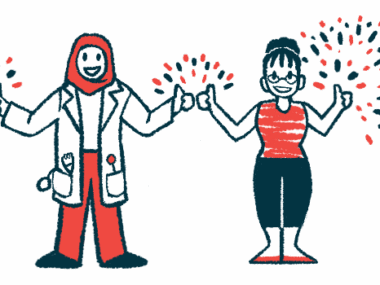PiaSky available to PNH patients in US via Onco360 pharmacy
Specialty pharmacy chosen to supply injection therapy to eligible teens, adults
Written by |

The specialty pharmacy Onco360 was selected to supply PiaSky (crovalimab-akkz), an antibody-based medication that works to reduce red blood cell destruction, to teenagers and adults with paroxysmal nocturnal hemoglobinuria (PNH).
Marketed by Genentech (a Roche subsidiary) in the U.S., the treatment was recently approved by the U.S. Food and Drug Administration (FDA) for patients ages 13 and older, weighing at least 40 kg (88 pounds).
“Onco360 is grateful for the opportunity to become a specialty pharmacy provider for [PiaSky],” Benito Fernandez, Onco360’s chief commercial officer, said in a pharmacy press release. “We are proud to add another treatment option for PNH patients to our portfolio.”
PiaSky works to block complement cascade activation leading to hemolysis
Often, PNH is caused by mutations that result in no or low levels of certain proteins on the surface of blood cells, which normally protect them from being attacked by the body’s immune system. As a consequence, the complement cascade — a part of the immune system — becomes abnormally activated and destroys red blood cells (hemolysis), leading to a range of disease symptoms.
PiaSky blocks the activation of the complement cascade by preventing the C5 complement protein from being cleaved, or split, into two subunits called C5a and C5b. As such, the treatment is expected to stop hemolysis inside blood vessels. Two previously approved therapies for PNH, Soliris (eculizumab) and Ultomiris (ravulizumab), also work by preventing C5 cleavage.
However, PiaSky intends to provide a more convenient dosing regimen than those treatments, with patients receiving a first intravenous (into-the-vein) infusion loading dose followed by four weekly subcutaneous (under-the-skin) injections. Maintenance doses then are given by injection once every four weeks.
A maintenance regimen for Soliris, an infusion therapy for adults in the U.S., is every two weeks. With Ultomiris, the maintenance regimen is once a week as an injection treatment for adults, and — as an infusion treatment — once every two months for adults and once every one or two months depending on weight for children.
The treatment’s approval mainly was based on data from the Phase 3 COMMODORE 2 clinical trial (NCT04434092), which evaluated whether PiaSky was inferior to Soliris in its ability to control hemolysis in PNH patients.
A total of 204 children and adults, not previously treated with C5 inhibitors, were randomly assigned to PiaSky (135 patients) or Soliris (69 patients) at their recommended dosing regimens for about six months.
Results supported similar efficacy for both treatments, with similar proportions of patients achieving hemolysis control and similar proportions going without a need for blood transfusions.
Dispensing PiaSky requires certification in risk management program
The treatment’s safety also was supported by the COMMODORE 2 and the Phase 3 COMMODORE 1 (NCT04432584) trials. COMMODORE 1 assessed PiaSky’s safety and efficacy in PNH patients previously treated with Soliris or Ultomiris. Overall, the most common side effects to treatment, occurring in 10% of the patients or more, included infusion-related reactions, respiratory tract infections, viral infections, and allergic reactions.
Due to the risk of serious and life-threatening meningococcal infections, patients should receive a meningococcal vaccination two weeks before starting with PiaSky. Preventive antibacterial treatments may be given alongside PiaSky for those not properly vaccinated and in need of urgent treatment.
PiaSky is available in the U.S. through a restricted program called PIASKY Risk Evaluation and Mitigation Strategy, meaning it can only be prescribed by certified healthcare providers and dispensed at certified pharmacies.






